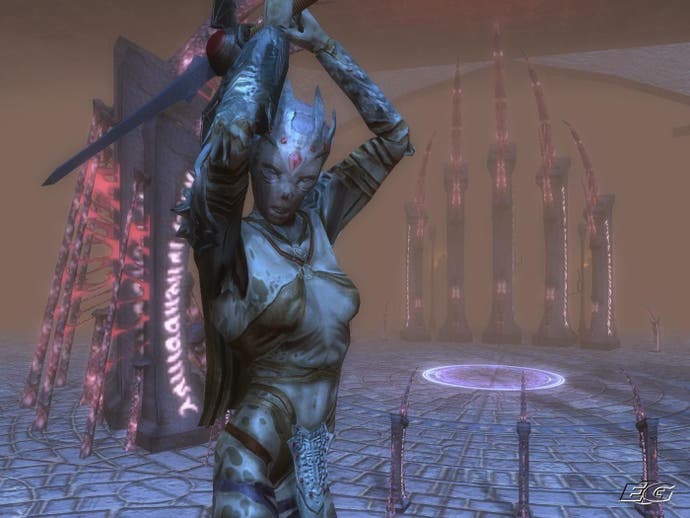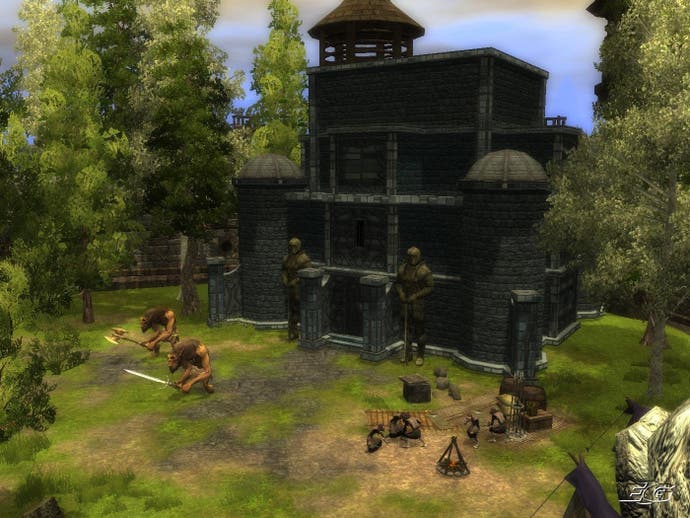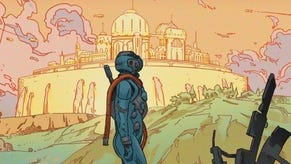Neverwinter Nights 2
Winter: it'll all be over by Christmas [spring, surely - Ed].
Much like reviewing its prequel, Neverwinter Nights 2 offers you a challenge. Do you review it just as any old videogame - that is, the adventure in the box - or do you measure the power of the creation tool included into the box, and think about all the mods that'll result from it?
Well, you do the former, clearly. As great as the tools may be, you don't mark for something that doesn't exist. Most people with the original didn't do this, as otherwise its fairly rubbishy campaign would have lowered its marks hugely. Yes, eventually it was worth buying Neverwinter Nights... but only for what it allowed you to play rather than anything in the box.
However, with this new spirit of rigour, it's lucky that Obsidian - whom pals Bioware chose to develop Neverwinter Nights 2 while they go off and do The Things Of The Future - have just made a great fantasy role-playing game.
Phew.
Far more than Neverwinter Nights, this is something that slides easily into this particular lineage of the RPG canon. You know - the Fallout/Baldur's Gate/Planescape Torment/Knight of the Old Republic strain. Rather than the loneliness of your slightly idiotic henchmen, you're gifted a small party of idiosyncratic partners you get to control directly, equip and generally get familiar with. Rather than a constrained small environment, it includes a Baldur's-Gate-esque world-map that allows you to travel from locale to locale.

Despite the fact it's dealing with a far more mainstream/clichéd fantasy world, Obsidian has managed to craft a memorable supporting cast of NPCs. The tone's set from the first character you meet - a brawling dwarf who enjoys starting fights. It's familiar from every classical RPG you've ever played. The twist is that he's a dwarf who's obsessed with becoming a monk. Why a monk? Because they're just glorified pub-brawlers, aren't they. Smart deconstruction of the fantasy world - enormously funny and enormously cute. One of the biggest strengths of Neverwinter Nights 2 is simply the quality of its writing.
It does all this without significantly losing any of the better points of the original Neverwinter Nights. For a Dungeons & Dragons fan the absolute mass of rules crammed into the game is somewhat dizzying. Be a tiefling? Why not. What prestige class do you want to be? And on and on and on. For someone whose bookshelves aren't wobbling under the weight of Monster Manuals, it's dizzying too, but in terms of look at all this stuff. It's a big game, however you care to define it.
It's far from perfect. It doesn't have the mass of bugs that ruined Knights of the Old Republic 2 for many people; rather it has areas where some mix of design and technology conspired to render it less than it should be. The biggest aggravations come from the perennial bugbears of pathfinding and NPCs' artificial intelligence. The latter's a far more pressing problem in terms of play. Agreeably, you have all manner of options you can turn on or off, which alter NPC in precise ways - shall they use their equipment unprompted and so on. But the problem with this is that if you give the computer any control over AI, it's only fine up to a point, in a low-level conflict; when you're in an area where precise control is required, your companions are more likely to go running off and deal with a distant foe rather than staying close and working like a party. It's at its worst when you're trying to make the party actively run away. Essentially, when you're engaged, you're engaged, and everyone on one side is going to end up as experience points for the other.

Alternatively, if you want the full control, you can turn off any significant AI (except following) and directly give all the orders for your eight-legged XP-grind machine, supported by the handy pause key. But it's clear that the engine isn't really designed for such precision. Skipping between each individual and choosing their target every time they kill someone is just tiresome for extended periods. RTS-style drag-and-drop multi-character select would have helped, but isn't here.
You wish Obsidian had proposed a happy medium between characters being completely passive and adventurers going off on adventures by themselves. You know - stay near the leader and hit anyone within arms reach once you've put someone down. Coming straight from playing the (brilliant, randomly) Guild Wars: Nightfall, it's clear how clunky Neverwinter Nights 2's party control system is.
Then there are the other minor problems. Like your being unable for some reason to redefine keyboard shortcuts when actually playing the game, and not being able to redefine a mass of your shortcuts at all. In fact, a load of them aren't even listed in the game. It's as though they expected you to actually read the manual, like it was 1987 or something.
Then there's the save system. While you can save anywhere, the game's enormously stingy with the checkpointed auto-saving. For example, in the opening segment when you're defending your village and investigating something in the swamp - the first half hour or hour of play, depending on your speed - there isn't a checkpoint. Generally, the game only appears to save by itself when you travel on the world-map, and rarely anywhere else. Would it have killed the developer to do one when you're going down a dungeon level occasionally? While the game actively advises you to save regularly, if you're actually enjoying a game like Neverwinter Nights you simply don't. You don't die regularly enough to worry about it in the same way you would in a first-person shooter, but the loss in terms of time when you do die is relatively huge.

However, as grating as all these aspects are, they're things which are worked around. You remember to save. You balance whether you want AI or direct control depending on how difficult a fight is. You (er) remember the buttons.
Seven or an eight, seven or an eight...
There's a nagging sense that - perhaps - we're reaching the end of the road of the Black-Isle/Bioware model western-style role-playing game. Jade Empire reviewed well, but disappeared almost immediately from public discourse, dismissed as a Knights of the Old Republic in wushu clothing. Yeah, it was good, but it was good in the same old way. Whatever Bioware do with Dragon Age will be very interesting. In that way, while hugely improved over the original Neverwinter Nights' campaign, this is essentially Baldur's Gate. Shouldn't we be looking for...
Rewind that. This is essentially Baldur's Gate.
While its design is starting to show its age a little, the engine is far from perfect and so on and so forth and so bloody whining, there's still enough of the magic here which will reduce the seasoned PC role-playing gamer to rapture. It's not the future of PC gaming, but a glorious slice of the recent past. This may be the last adventure like this you'll ever go on. And there's a certain style and grandeur to anything like that.
In short, great. But what's next?





